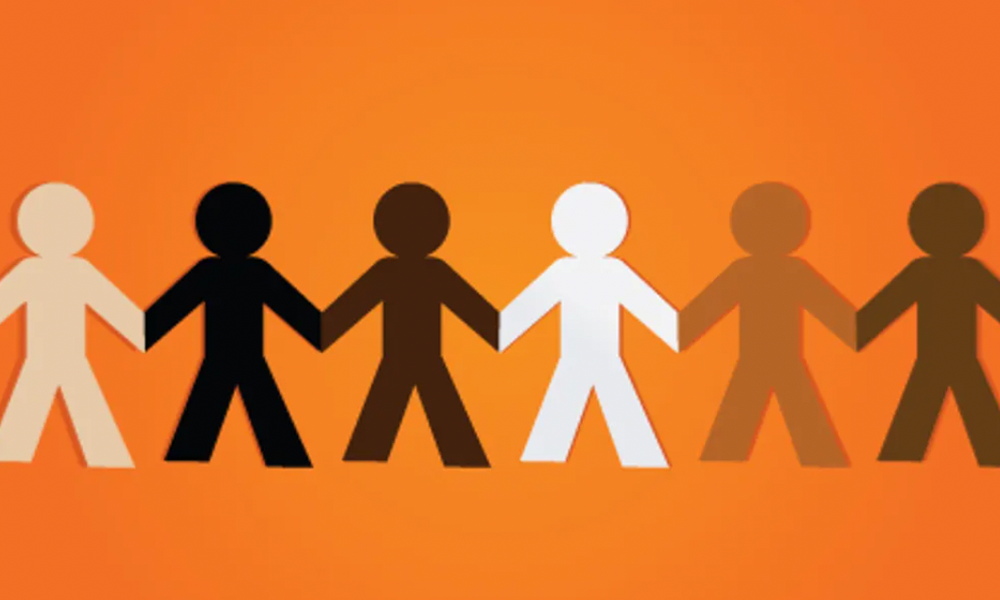What does it mean to be an ally? And how can you leverage these lessons to help bolster allyship in the workplace?
While there may be several interpretations, at its core, being an ally requires a person of privilege, to use that privilege to help remove barriers and challenge systems that continue to negatively impact marginalized groups. Being an ally means that you commit to listening, learning from, and helping to amplify their voices.
As an ally in the workplace, you are a critical part of helping build Diversity, Equity, Inclusion, and Belonging in your environment. Having strong allyship in the workplace allows employees to bring their entire selves to work and to feel comfortable and safe expressing who they are. And while leadership certainly helps set the tone in cultivating and nurturing an inclusive and equitable environment, allyship in the workplace does not solely fall on the shoulders of managers and C-Suite executives. You can be an ally at any level or stage of your career.
Following are some tips on how to be an ally at work:
EDUCATE YOURSELF ON HOW TO BE AN ALLY
It’s easy to assume that the best way to learn about how inequality has affected marginalized groups is to ask members of these communities. But that educational burden should not fall on those impacted.
As an ally, it’s important to seek out books, articles, webinars, films, podcasts, and other materials that speak to the many challenging issues that others face on a daily basis. You can also sign up for formal DEI-focused trainings or even seek professional certifications in this area.
Keep in mind that members of marginalized and underrepresented groups are not all going to have the same experience. This is especially true when you take intersectionality into account. White women, for example, will not have the same experiences as women of color, just as black and Latino men will not have the same experiences as black and Latino men who are also part of the LGBTQ+ community.
PRIORITIZE INTERNAL REFLECTION
The reality is most people have some blind spots when it comes to racism and also some degree of unconscious bias. So once you’ve made the commitment to be an ally it is important to first look within yourself and question what implicit biases you may have. Being an ally is not always easy and it can require serious self-reflection. Think back on situations at work where you might have inadvertently said the wrong thing or instances when you stayed silent when you could have spoken up. Part of being an ally is understanding that you have already and will in the future, make mistakes. And that’s OK. The lesson here is to continually learn and grow.
LISTEN INTENTLY, OBSERVE CLOSELY
Listen to what marginalized people in your workplace are saying, in their face-to-face communications and also through their body language.
Also, when the news of the day is dominated by yet another racially motivated attack or injustice, be aware of how these headlines might be impacting your colleagues.
Pay attention to how members of marginalized groups experience meetings and other group gatherings, and be on alert for inequities and disparities in how people are being treated, acknowledged, and given credit.
SPEAK UP
If you witness injustice in action, whether it be in a meeting or passing conversation, speak up.
This part of allyship in the workplace can be difficult, especially for those averse to confrontation. But as an ally, it is critical to understand that silence can be viewed as complicity. If you witness racist, sexist, bigoted, or otherwise offensive behavior – be clear and direct in trying to shut them down.
Calling out offensive behavior isn’t the only way to use your voice as an ally. A great way to foster allyship in the workplace is by amplifying and promoting the good work of your colleagues. Speak up to promote, nominate, and give credit to historically marginalized voices.
COMMIT TO DOING THE WORK
The most important part of allyship in the workplace is to show up and do the work every day. Commit to the steps discussed, but don’t stop there. If someone from a marginalized group invites you to go to an event that speaks to the challenges in their community, be there to listen, learn, and show your support. If you are involved in hiring at your organization, prioritize bringing in a diverse pool of candidates.
Stay engaged. As an ally, you have made a personal pledge to stand in the discomfort and using your voice to be an advocate for change. This is a true commitment, not a switch you can turn on and off.
24 SEVEN’S COMMITMENT TO DIVERSITY
As an organization 24 Seven is committed to cultivating an inclusive workplace that promotes and values diversity. And as a female-founded and majority-female-led organization, 24 Seven is keenly aware of how important it is to build and maintain diverse teams as it is both good for an organization’s bottom line and the right thing to do.
Our team of specialized recruiters are focused on helping clients advance their workplace diversity through equitable sourcing and hiring processes.
Contact us today to learn more about how our recruiters can help you with your full-time and freelance hiring needs.

